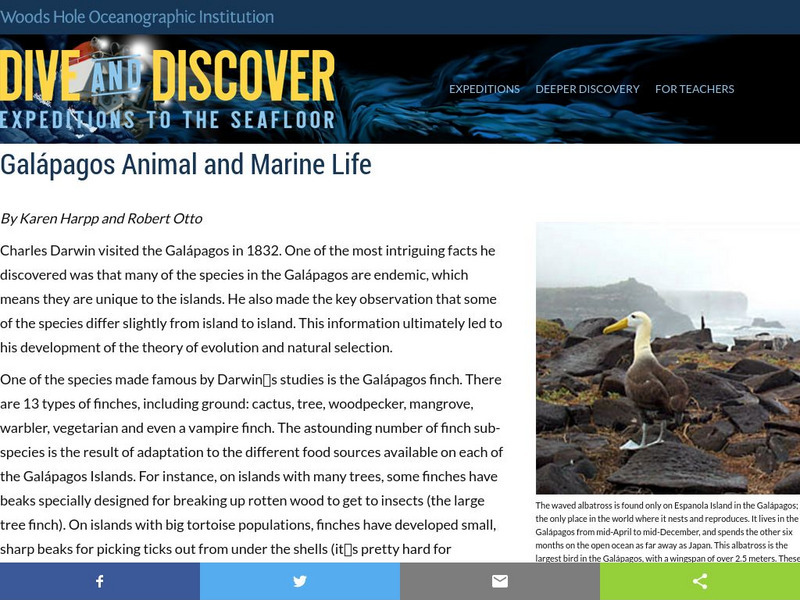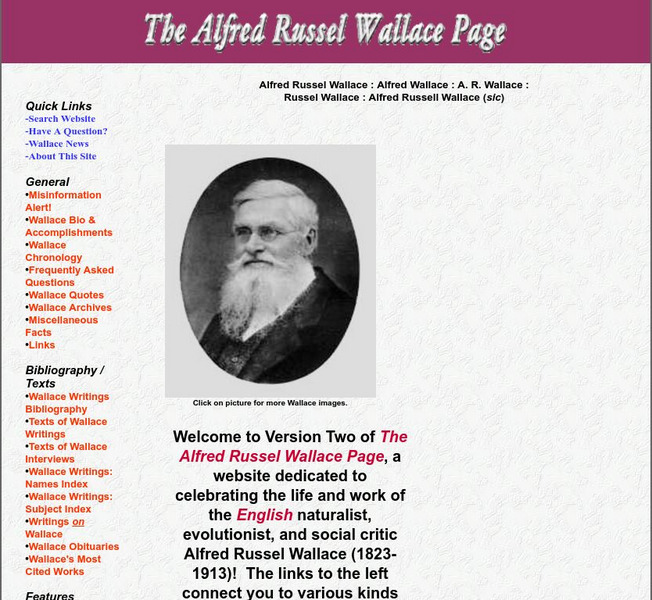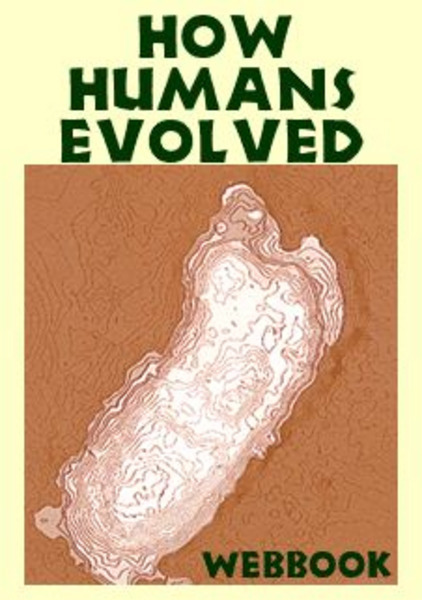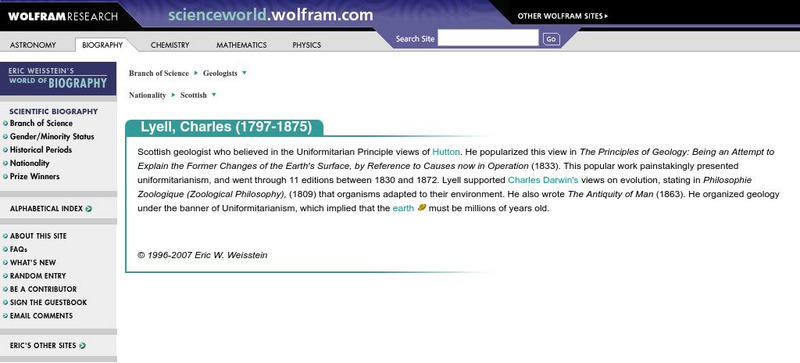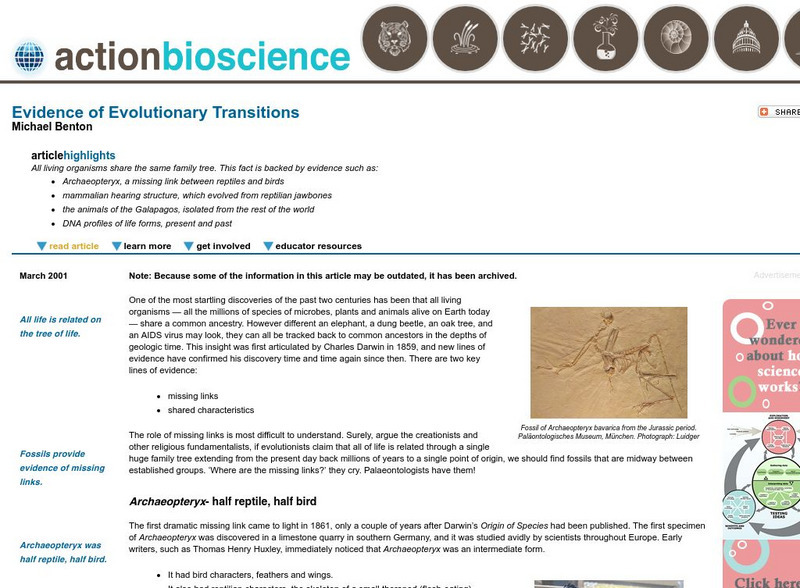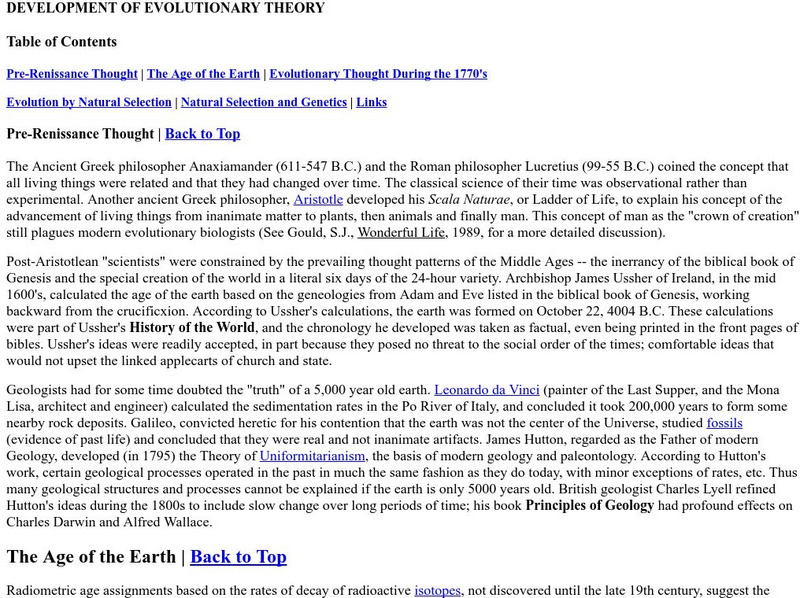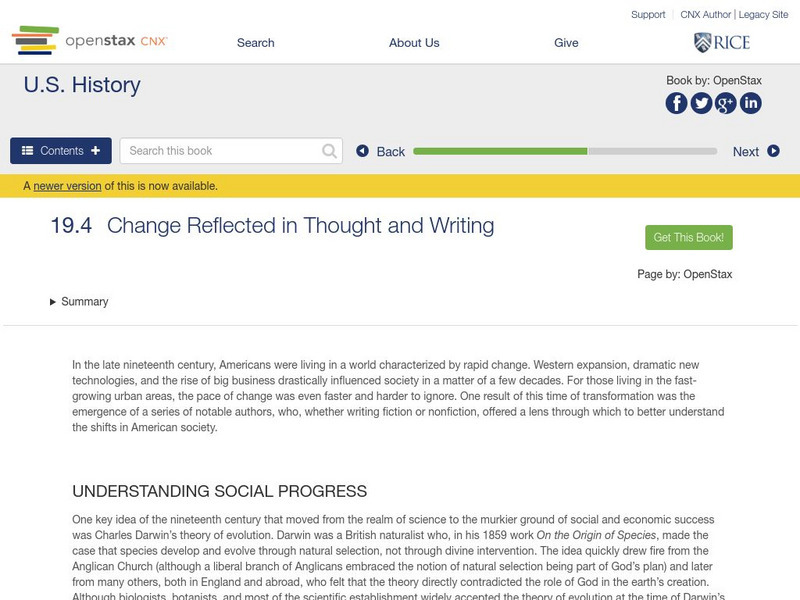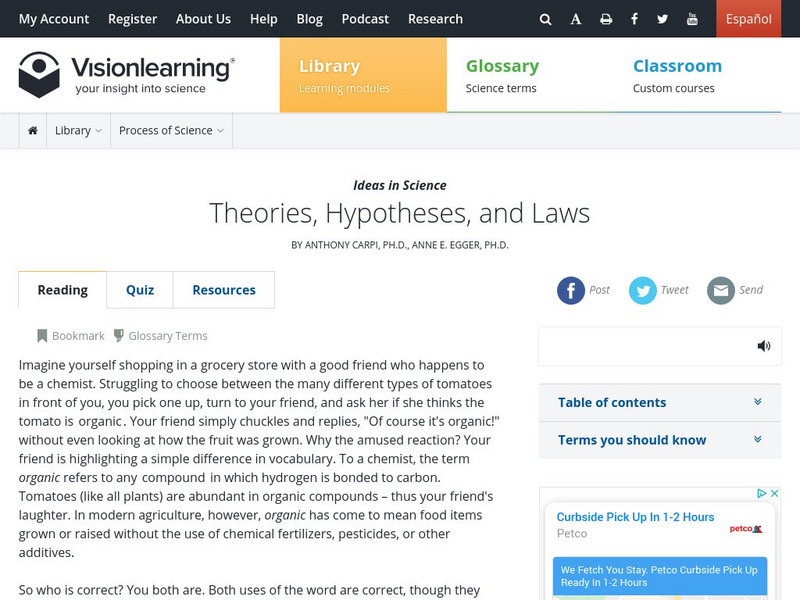PBS
Pbs Nova: Explore the Galapagos
Using the interactive, multimedia map, see the Islands as they exist today and learn how they inspired Darwin, who pointed to them as the "origin of all my views." You can trace the trip of Darwin and hear from biologists at each spot....
Story Behind the Science
Story Behind the Science: Alfred Russel Wallace [Pdf]
A detailed biography of Alfred Russel Wallace, known especially for his theoretical work on evolution, which was published prior to Charles Darwin's own theory. Questions are posed throughout about the nature of scientific research.
Woods Hole Oceanographic Institution
Woods Hole Oceanography Institute: Galapagos Animal and Marine Life
Find out what types of animals Charles Darwin saw when he visited the Galapagos Islands. A slide show of animals and explanations for their evolution are also featured on this site.
National Science Foundation
National Science Foundation: Evolution of Evolution: 150 Years of "On the Origin of Species"
When the "Origin of Species" was published in 1859, the ambitions and scopes of science were dramatically expanding. "Origin of Species" marked the transition of biology from a prescience to a science. [4:04]
PBS
Pbs Learning Media: Complex Relations
In this text excerpted from Chapter 3, "Struggle for Existence," of Charles Darwin's "On the Origin of Species," Darwin draws on firsthand and historical information for his observations about evolution.
Google
Google Maps: Galapagos Islands
Explore isolated volcanic islands. Charles Darwin's observations and collections of the Galapagos wildlife in 1835 contributed to his theory of evolution by natural selection. [7:08]
Other
Alfred Russel Wallace
A complete resource including a biography, chronology, examples of Wallace's published work, quotes, and interviews.
W. W. Norton
W. W. Norton & Company: How Humans Evolved
This provides access to a webbook about How Humans Evolved. The following topics are covered: (1) How Evolution Works, (2) Primate Behavior and Ecology, (3) The History of Human Lineage, and (4) Evolution and Modern Humans. Each chapter...
Wolfram Research
Wolfram Science World: Charles Lyell
This site from ScienceWorld describes the Scottish geologist Charles Lyell who supported the ideas of the uniformitarian principle and aligned himself with James Hutton's ideas. He also supported and refuted some of the ideas of Charles...
Curated OER
Science Kids: Science Images: Charles Darwin
This is a black and white photo of Charles Darwin, a legendary scientist famous for his work on evolution and natural selection. Check out our Charles Darwin facts page for more information.
American Institute of Biological Sciences
Action Bioscience: Evidence of Evolutionary Transitions
Charles Darwin's theory that all living organisms are connected in some way has been confirmed through intense studies over centuries. Understand the similarities that bond all things living to the same family tree by checking out this...
Curated OER
National Library of Medicine: Darwin's Hms Beagle
The HMS Beagle is the ship Charles Darwin sailed an his journey to study life science.
Vision Learning
Visionlearning: Biology: Galapagos Finches
Interactive animation illustrates how Charles Darwin used his study of finch beaks to explain evolution. A phylogenetic tree diagram shows how the birds' color and beak shape changed over generations.
Famous Scientists
Famous Scientists: Alfred Russel Wallace
Learn about the life and work of Alfred Wallace, who is best known for independently conceiving the theory of evolution through natural selection; his paper on the subject was jointly published with some of Charles Darwin's writings.
Sacred Text Archive
The Descent of Man Full Text
This site has the complete text of Charlies Darwin's "Descent of Man."
University of California
Ucmp: A History of Evolutionary Thought
Museum site note on the history of evolutionary thought and includes scientists and thinkers who have contributed to our understanding of life on Earth. Links are provided for da Vinci, Linneaues, Erasmus Darwin, and others.
Curated OER
Educational Technology Clearinghouse: Clip Art Etc: Charles Darwin
An English naturalist who established that all species of life have descended over time from common ancestry. He proposed the theory of natural selection and evolution.
PBS
Pbs Teachers:how Does Evolution Work?
Complete a hands-on lab simulation of natural selection to learn how it impacts a breeding population. Perform an online laboratory simulation and examine the interplay between natural and sexual selection in a population.
Estrella Mountain Community College
Online Biology Book: Development of Evolutionary Theory
Using diagrams and descriptive illustrations, this college-level biology reference book discusses the development of evolutionary theory.
OpenStax
Open Stax: Urbanization 1870 1900: Change Reflected in Thought and Writing
American writers and intellectuals played an important role in articulating the changes taking place in Industrial America in the late 1800s and early 1900s. Learn about some of the prominent writers, scientists, and philosophers at that...
Other
Historical Thinking Matters: The Scopes Trial
This award-winning site has everything you need for online lessons or independent study about the Scopes Trial. Uses an inquiry based approach with lots of primary sources, and the material can be used in conjunction with almost any...
Vision Learning
Visionlearning: Ideas in Science: Theories, Hypotheses, and Laws
Learning module looking at scientific explanations. Discussion covers theories and how they develop, some well-known theories and their origins, and how theories are revised and refined. Also, covers hypotheses and laws. The three...
Read Works
Read Works: When Fish First Walked
[Free Registration/Login Required] An informational text about natural selection and its role in the theory of evolution. A question sheet is available to help students build skills in reading comprehension.
TED Talks
Ted: Ted Ed: Why the Insect Brain Is So Incredible
Charles Darwin called the brain of the ant "one of the most marvelous atoms of matter in the world." Anna Stockl takes us inside the tiny but mighty insect brain. [4:22]



![Story Behind the Science: Alfred Russel Wallace [Pdf] Article Story Behind the Science: Alfred Russel Wallace [Pdf] Article](https://d15y2dacu3jp90.cloudfront.net/images/attachment_defaults/resource/large/FPO-knovation.png)
